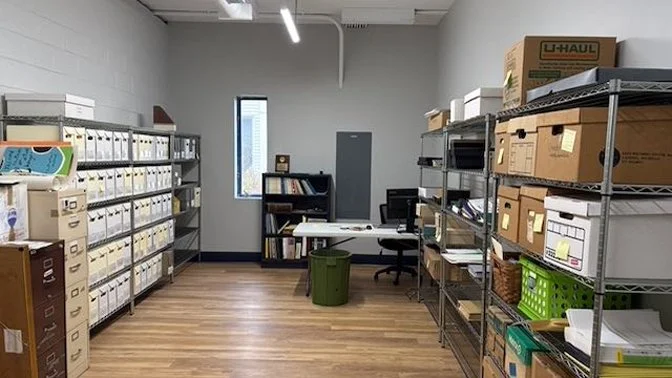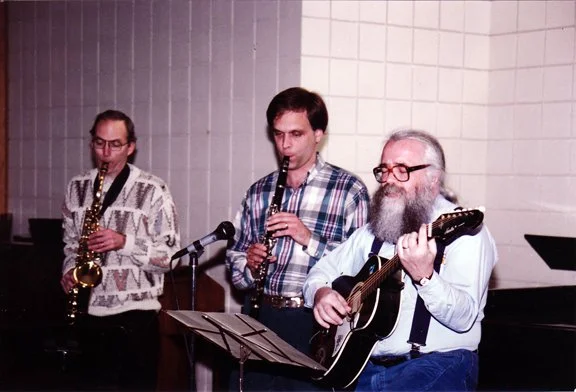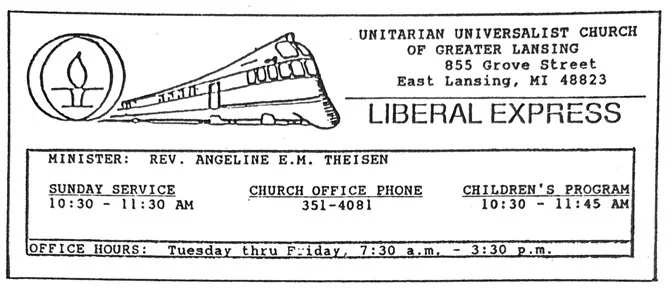Echoes of 1992: Change, Challenge, and Community at UU Lansing
by Ed Busch, UU Lansing Church Archivist
Over the last week, the UU Lansing Archives have found a new home. The archives are now located in Room 113 of the renovated West Wing of the church, moved from my basement and various closets into a dedicated space. The creation of this new space reflects how deeply our congregation treasures its history and heritage.
It will take some time to unpack and get everything organized, but eventually the archives will be open occasionally after Sunday services and by appointment for research. Once things are in place and some basic operating procedures are drafted, I’ll be putting out a call for interested volunteers to form an Archives Committee to help preserve, organize, and share our congregational story.
UU Lansing Church Archives, room 113. (IMG_6602)
Looking Back: November 1992 at UU Lansing
In this week’s UU Lansing history blog, we travel back to November 1992—a month of national change, community conversations, and congregational challenges that still echo in some ways with our present.
National, State, and Local Headlines
November 1992 was a time of political transition. On November 3, Bill Clinton was elected the 42nd President of the United States, defeating incumbent George H. W. Bush and independent candidate Ross Perot. In Michigan, voters returned Governor John Engler to office, while Lansing’s local papers reflected both hope and anxiety—covering topics from layoffs at General Motors to debates about health care reform and the environment.
Closer to home, the Lansing State Journal featured stories about local arts and education initiatives, as well as church and community events. Among them were several that took place right at the Unitarian Universalist Church of Greater Lansing, including workshops on child abuse awareness, art exhibits by local women artists, and a memorial service for Warren C. Kellogg, a former Brooklyn Dodgers pitcher and World War II veteran who had connections with our congregation.
Life in the Congregation
In November 1992, our minister was Rev. Angeline E.M. Theisen, who had served UU Lansing since 1987. Alexandra Walker was Board President, and Carol Ohlrogge directed Religious Education.
Board minutes from October 26, 1992, reflect that the congregation was navigating a time of tension and differing perspectives regarding leadership and communication. Discussions about relationships within the congregation were ongoing, reflecting both care and concern for the health of the community. These challenges eventually contributed to a congregational split in 1994, when a group of members formed the All Souls Church of Lansing, which remained active until 2001.
Despite these struggles, church life was full and creative. The Welcoming Congregation Committee was introducing the UUA’s groundbreaking study program on inclusion of lesbian, gay, and bisexual members. Guest speaker Zoe Starkweather from the Flint UU Church spoke on “There Are No Borders Here,” marking an early step in what would become a decades-long commitment to LGBTQ+ inclusion at UU Lansing.
Rev. Theisen’s sermon for November 8, “The Only Time You Hear the Name Jesus…”, explored UU discomfort with Christian language, while guest speaker Dr. Richard Scobie, Executive Director of the Unitarian Universalist Service Committee, spoke later in the month on “Promise the Children,” addressing poverty and moral responsibility.
Church Activities and Events
The fall calendar was full of energy:
· Circle Supper dinners fostered community connections.
· The Men’s Group, Women’s Book Reading Group, and Tomesters reading circle offered weekly discussion and friendship.
· The Religious Education program was vibrant, with UNICEF Pumpkin Sunday, youth retreats, and the annual Stone Soup Luncheon—this year benefiting both OXFAM and UUSC.
· A Canned Food Drive organized by the 7th and 8th grade RE students aimed to build a 5-foot-10-inch “can tower” for donation to the Economic Crisis Center.
· The Dream Team continued the 1993 Pledge Drive, themed “Weaving Our Dreams.” By mid-November, pledges totaled $53,452 toward a goal of $174,646.
Other events included a Health Care Crisis Workshop at Pilgrim Congregational Church and two Breaking the Silence workshops on child abuse awareness held at UU Lansing, tied to an art exhibit at Schuler Books in Okemos.
In the local arts community, the Working Women Artists group announced a scholarship for Lansing-area women artists, with an exhibit and sale planned for March 1993 at our church.
Roy Erickson, Chris Christoff, Randy Scott in 1992. (2007.0320)
From the Archives
These details come from the Liberal Express church newsletter, Board of Trustees records, and articles in the Lansing State Journal from November 1992. Together they paint a picture of a congregation navigating both inspiration and difficulty—balancing deep introspection with the steady rhythm of Sunday worship, RE activities, music, and social action.
Liberal Express Newsletter banner, November 1992.
Reflection
As we look at the financial discussions and stewardship challenges of today, it’s striking how themes from 1992 resonate still—pledge drives, community engagement, questions of leadership, and the enduring desire to live our UU values in a complex world.
Share Your Thoughts
If you have memories, photos, or newsletters from this period—or any corrections or additions—I’d love to hear from you. Please send your comments or suggestions to: uucgl.archives@gmail.com.
About Me
I’m a member of the Unitarian Universalist Church of Greater Lansing and serve as the volunteer blog archivist for our congregational history series. I’m retired from Michigan State University, where I worked in digital preservation and archives. I enjoy uncovering stories from church newsletters, board records, and local history sources to help connect our past with the present.
This piece was developed with research assistance and editorial support from ChatGPT.



